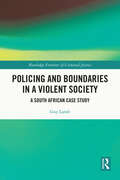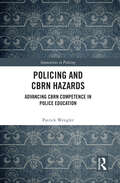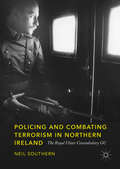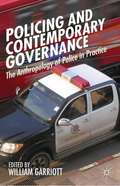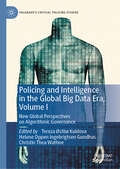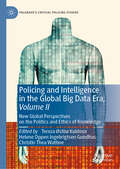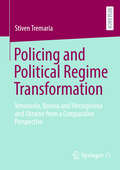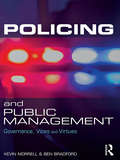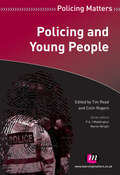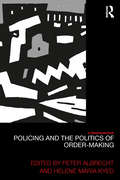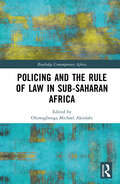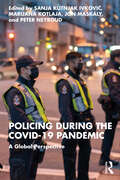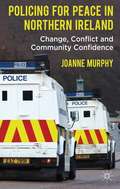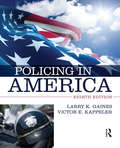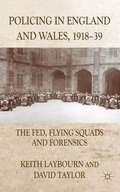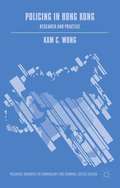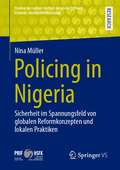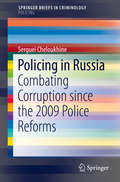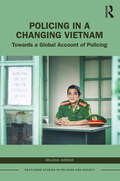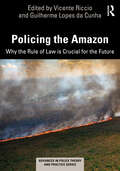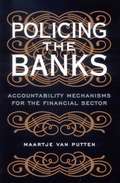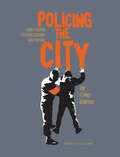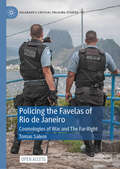- Table View
- List View
Policing and Boundaries in a Violent Society: A South African Case Study (Routledge Frontiers of Criminal Justice)
by Guy LambThis book explores how social and territorial boundaries have influenced the approaches and practices of the South Africa Police Service (SAPS). By means of a historical analysis of South Africa, this book introduces a new concept, ‘police frontierism’, which illuminates the nature of the relationships between the police, policing and boundaries, and can potentially be used for future case study research. Drawing on a wealth of research, this book examines how social and territorial boundaries strongly influenced police practices and behaviour in South Africa, and how social delineations amplify and distort existing police prejudices against those communities on the other side of the boundary. Focusing on cases of high-density police operations, public-order policing and the recent policing of the COVID-19 lockdown, this book argues that poor economic conditions combined with an increased militarisation of the SAPS and a decline in public trust in the police will result in boundaries continuing to fundamentally inform police work in South Africa. This book will be of interest to scholars and students interested in policing in post-colonial societies characterised by high levels of violence, as well as police work and police militarization.
Policing and CBRN Hazards: Advancing CBRN Competence in Police Education (Innovations in Policing)
by Patrick WenglerThis book makes an important contribution to police scholarship by focusing on the critical need for law enforcement personnel to receive education on chemical/biological/radiological/nuclear (CBRN) hazards. Under the CBRN umbrella are chemical warfare agents, toxic industrial chemicals, biologically derived toxins, radiological particulate hazards, and other agents, any of which have the potential to inflict bodily harm, incapacitation, or death. Such weapons have been a part of human history for centuries, starting with biological warfare, later shifting over to chemical warfare, and in the last century, radiological and nuclear warfare. The greater availability and accessibility of such materials necessitates that first response and investigation is no longer limited to the military but is required of police forces reacting to incidents in the community, whether acts of terrorism, traffic accidents, or standard industrial incidents. In this book it is argued that basic knowledge of CBRN is essential for police officers at all levels to assess and protect crime scenes, as well as to investigate cases involving CBRN materials. The author uses case studies and technical education to instruct police on how and when CBRN agents can be used maliciously, and the best methods for identifying, analysing, monitoring, and investigating related incidents. The text makes a clear case for integrating CBRN studies into police education so that first responders are enabled to assess incidents and share information with emergency management and other services to determine the most effective equipment and personnel to deploy. This book is essential for police educators and trainers in both universities and police academies, those administering or engaged in in-service police training, and scholars studying policing, criminal justice, and terrorism.
Policing and Combating Terrorism in Northern Ireland: The Royal Ulster Constabulary Gc
by Neil SouthernThis book explores the challenges of combating terrorism from a policing perspective using the example of the Royal Ulster Constabulary GC (RUC) in Northern Ireland. The RUC was in the frontline of counter-terrorism work for thirty years of conflict during which time it also provided a normal policing service to the public. However, combating a protracted and vicious terrorist campaign exacted a heaving price on the force. Importantly, the book addresses a seriously under-researched theme in terrorism studies, namely, the impact of terrorism on members of the security forces. Accordingly, the book examines how officers have been affected by the conflict as terrorists adopted a strategy which targeted them both on and off duty. This resulted in a high percentage of officers being killed whilst off duty - sometimes in the company of their wives and children. The experience of officers' wives is also documented thus highlighting the familial impact of terrorism. Generally speaking, the victims of terrorist attacks have received scant scholarly attention which has resulted in victims' experiences being little understood. This piece of work casts a specific and unique light on the nature of victimhood as it has been experienced by members of this branch of the security forces in Northern Ireland.
Policing and Contemporary Governance
by William GarriottWhat is it that police and policing actually do? What are the effects? How are these effects mediated and experienced by different people at different times and in different contexts? This volume draws attention to the centrality of police and policing to the project of governance and the experience of being human in the contemporary world.
Policing and Intelligence in the Global Big Data Era, Volume I: New Global Perspectives on Algorithmic Governance (Palgrave's Critical Policing Studies)
by Tereza Østbø Kuldova Helene Oppen Ingebrigtsen Gundhus Christin Thea WathnePolicing and Intelligence in the Global Big Data Era, Volume I, the first of a two volume set, presents a rich and unique collection of global perspectives on data-driven predictive technologies and the expansion and use of surveillance apparatuses in policing and intelligence, both public and private. Centered around the notion of ‘algorithmic governance’, this volume explores various practices of abstract and intelligence-led policing within the context of surveillance and regulatory capitalism. Each chapter interrogates these concepts as much as realities on the ground as they play out across the globe – from Russia, USA, India, Brazil to Denmark, Germany and Norway. The volume offers a unique insight into the ways in which technologies and data-driven practices – from facial recognition, predictive algorithms, to generative AI – are reshaping cultures of policing both within and beyond police proper. Particular attention is paid to the simultaneous privatization and pluralization policing and intelligence and to the proliferation of new intelligence actors. Academics, students and readers interested in the fields of criminology, social anthropology, critical algorithm.
Policing and Intelligence in the Global Big Data Era, Volume II: New Global Perspectives on the Politics and Ethics of Knowledge (Palgrave's Critical Policing Studies)
by Tereza Østbø Kuldova Helene Oppen Ingebrigtsen Gundhus Christin Thea WathneThis volume, the second of a two volume set, offers a rich and unique collection of global perspectives on data-driven predictive technologies and the expansion and use of surveillance apparatuses in policing and intelligence, both public and private. Volume II delves into the epistemologies of data, into the imaginaries of accuracy, and fantasies of technosolutionism, utilizing empirical case studies to interrogate the use of data in policing, while raising questions pertaining to governance, ethics and knowledge construction. The chapters span from exploring the construction of clean and dirty data in private and public policing in South Africa, discussions about facial recognition and technopolitics in Brazil, the construction of intelligence and organizational learning in Norwegian police ethics and broader questions of transparency, data quality, and trust in data-driven policing, to the very topical issues of policing of generative AI and the ways in which both authoritarian and liberal democracies, such as China and India, use biopolitics to turn social welfare into surveillance. Academics and students of criminology, social anthropology, critical algorithm studies, critical sociology, and regional studies, will find this timely volume of interest.
Policing and Political Regime Transformation: Venezuela, Bosnia and Herzegovina and Ukraine from a Comparative Perspective
by Stiven TremariaThis book offers a comprehensive study on the dynamics of policing under contexts of political regime transformation in the interplay between democratization and de-democratization through a cross-case comparative analysis among Venezuela, Bosnia and Herzegovina and Ukraine. The central concern lies in working out the intertwining between politics and policing by examining the development trajectories of democratic police reforms under scenarios of democratic stagnation, backsliding and autocratic consolidation. In particular, this book analyzes those changes experienced by the police as an institution, their powers and the practices for policing society in the framework of the endeavors for politicization, militarization and informalization of policing. This analysis is addressed from a macro-level actor-based approach, which accounts for the decisive role of ruling political actors and senior police managers as critical players who influence the decisions and patterns of political regime transformation and policing. Therefore, this book offers a groundbreaking study of the interrelationship among contemporary processes of de-democratization and police counter-reform from an actor-based perspective.
Policing and Public Management: Governance, Vices and Virtues
by Ben Bradford Kevin MorrellPolicing and Public Management takes a new perspective on the challenges and problems facing the governance of police forces across the UK and the developed world. Complementing existing texts in criminology and police studies, Morrell and Bradford draw on ideas from the neighbouring fields of public management and virtue ethics to open the field up to a broader audience. This forms the basis for an imaginative reframing of policing as something that either enhances or diminishes "the public good" in society. The text focuses on two cross-cutting aspects of the relationship between the police and the public: public confidence and public order. Extending award-winning work in public management, and drawing on extensive and varied data sources, Policing and Public Management offers new ways of seeing the police and of understanding police governance. This text will be valuable supplementary reading for students of public management, policing and criminology, as well as others who want to be better informed about contemporary policing.
Policing and Security in Practice
by Tim PrenzlerModern policing is a vital institution for the defence of political and civil rights and for the protection of citizens from crime and fear of crime. Private security agents are also playing an increasingly important role in crime prevention and order maintenance, and also in protecting government assets and services. At the same time, crime and disorder remain major problems in contemporary societies, and there are ongoing issues of integrity and competency in many police departments and in the security industry. Policing and Security in Practice: Challenges and Achievements addresses questions of 'best practice' across police and security work by focusing on what the scientific literature says about how to achieve optimal outcomes in law enforcement, crime prevention and professional standards. Each chapter is written by subject experts with many years of research experience and of collaborative work with policing and security agencies. The book is a highly readable, inspiring and fully grounded guide to achieving the best in policing and security.
Policing and Young People (Policing Matters Series)
by P A J Waddington Martin Wright Tim Read Colin RogersAn accessible and up to date introduction to the key theme of policing and young people. This text gives a comprehensive overview of the issues involved in working with young people as offenders, suspects, witnesses, victims and citizens. It looks at perceptions of the young, and the role of the media in the context of current debates around anti-social behaviour, gangs and the family. The impact of multi-agency approaches on the way that young people are dealt with by the police and other agencies is considered, and additional chapters discuss police discretion and ethics, and safeguarding vulnerable young people.
Policing and the Politics of Order-Making (Law, Development and Globalization)
by Peter Albrecht Helene Maria KyedThis anthology explores the political nature of making order through policing activities in densely populated spaces across Africa, Asia and Latin America. Based on ethnographic research, the chapters analyze this complex with respect to marginalized young men in Haiti, community policing members and national politicians in Swaziland as well as other individual and collective actors engaged in policing and politics in Indonesia, Swaziland, Ghana, South Africa, Mexico, Bolivia, Haiti and Sierra Leone. What these contexts have in common is a plurality of order-making practices. Not one institution monopolizes the means of violence or a de facto sovereign position to do so. A number of interests are played out simultaneously, entailing re-negotiations over the very definition of what ‘order’ is. How and by whom a particular order is enforced is contested, at times violently so, and is therefore inherently political. In the existing literature on weak states, legal pluralism and policing in the Global South it is seldom made explicit that making order is a route to power and positions of political decision-making. It is this gap in the literature that this anthology fills, as it analyses the politics at stake in processes of order-making.
Policing and the Rule of Law in Sub-Saharan Africa (Routledge Contemporary Africa)
by Oluwagbenga Michael AkinlabiThis book argues that strengthening policing, and the rule of law is pivotal to promoting human rights, equity, access to justice and accountability in sub-Saharan Africa. Through a multidisciplinary approach, this book considers the principles of accountability, just laws, open government, and accessible and impartial dispute resolution, in relation to key institutions that deliver and promote the rule of law in selected countries in sub-Saharan Africa. Chapters examine a range of topics including police abuse of power and the use of force, police-citizen relations, judicial corruption, human rights abuse, brutality in the hands of armed forces, and combating arms proliferation. Drawing upon key institutions that deliver and promote the rule of law in sub-Saharan African countries including, Botswana, Ghana, Kenya, Madagascar, Nigeria, Rwanda, and South Africa, the contributors argue that strengthening policing, security and the rule of law is pivotal to promoting human rights, equity, access to justice and accountability. As scholars from this geographical region, the contributing authors present current realities and first-hand accounts of the challenges in this context. This book will be of interest to scholars of African studies, criminology and criminal justice, police studies, international law practice, transitional justice, international development, and political science.
Policing during the COVID-19 Pandemic: A Global Perspective
by Peter Neyroud Jon Maskály Marijana Kotlaja Sanja Kutnjak IvkovićProviding a global perspective on police adaptations to the COVID-19 pandemic, this book explores the extent of police organizational and operational changes in a number of countries as diverse as Brazil, China, South Africa, South Korea, the Philippines, Russia, the United Kingdom, and the United States. Bringing together a range of international experts, this book reflects on the changes in the broader social environment during the pandemic, examining the contours of police operational and organizational changes across several countries, analyzes the police enforcement of the government COVID-19 rules and regulations, explores the factors related to the COVID-19 effects on police officer wellness and safety, and studies police administrator, police officer, and citizen views about the potential consequences of organizational and operational changes on the interpersonal relations within police agencies and police–community partnerships. Policing During the COVID-19 Pandemic is essential reading for scholars and practitioners interested in exploring the police organizational adaptations, particularly in the times of emergencies, and the societal, cultural, and legal impacts of such adaptations. Sanja Kutnjak Ivković is Professor at the School of Criminal Justice, Michigan State University, USA. She is the Co-Editor of Policing: An International Journal. She is past Chair of the Division of International Criminology, American Society of Criminology, and past Chair of the International Division, Academy of Criminal Justice Sciences. Her co-authored and co-edited books on policing include: Exploring Contemporary Police Challenges, Police Code of Silence in the Times of Change, Police Integrity in South Africa, Exploring Police Integrity, Police Integrity across the World, Enhancing Police Integrity, Fallen Blue Knights, and The Contours of Police Integrity. Marijana Kotlaja is Assistant Professor in the Department of Criminal Justice and Criminology at the University of Missouri-Kansas City, USA. She is involved in evaluation research projects with many organizations, specifically focused on crime and place, and juvenile delinquency. She has led multiple international data collection efforts and has extensive knowledge of advanced quantitative methodology, including structural equation modeling, Bayesian analysis, and hierarchical linear models. She is the Secretary/Treasurer of the Division of International Criminology (American Society of Criminology), as well as the Editor of Around the Globe for the Criminologist. Jon Maskály is Assistant Professor in the Department of Criminal Justice at the University of North Dakota, USA. He won (with co-authors) the 2016 William L. Simon Outstanding Paper award from the Academy of Criminal Justice Sciences. His primary research interests revolve around issues in policing, notably police–community relations, police integrity, and police accountability. He has worked as a subject matter expert in several police reform projects around the nation. He has secured multiple contracts with police organizations to enhance their ability to make data-driven decisions. Peter Neyroud is Associate Professor in Evidence-Based Policing in the Jerry Lee Centre for Experimental Criminology, University of Cambridge, UK. He is the General Editor of the Oxford Journal Policing: A Journal of Policy and Practice. He set up and ran the UK National Policing Improvement Agency. He was commissioned by the UK Home Secretary to carry out a fundamental “Review of Police Leadership and Training,” which led to the establishment of the National “College of Policing.” He is the Co-Chair of the Campbell Collaboration Crime and Justice Coordinating Group.
Policing for Peace in Northern Ireland
by Joanne MurphyThis is the first in-depth analysis of the transition from the RUC to the PSNI seen through the eyes of key figures, inside and outside the organization. It provides a fresh insight into the wider social and political context in which this change occurred and is a significant contribution to the story of the Northern Ireland peace process.
Policing in Africa
by David J. FrancisThis wide-ranging collection offers fresh insights into a critical factor in development and politics on the African continent. It critically examines and illustrates the centrality of policing in transition societies in Africa, and outlines and assesses the emergence and impact of the diversity of state and non-state policing agencies.
Policing in America
by Victor E. Kappeler Larry K. GainesIn the field of law enforcement in the United States, it is essential to know the contemporary problems being faced and combine that knowledge with empirical research and theoretical reasoning to arrive at best practices and an understanding of policing. Policing in America, Eighth Edition, provides a thorough analysis of the key issues in policing today, and offers an issues-oriented discussion focusing on critical concerns such as personnel systems, organization and management, operations, discretion, use of force, culture and behavior, ethics and deviance, civil liability, and police-community relations. A critical assessment of police history and the role politics played in the development of American police institutions is also addressed, as well as globalization, terrorism, and homeland security. This new edition not only offers updated research and examples, it also incorporates more ways for the reader to connect to the content through learning objectives, discussion questions, and "Myths and Realities of Policing" boxes. Video and Internet links provide additional coverage of important issues. With completely revised and updated chapters, Policing in America, Eighth Edition provides an up-to-date examination of what to expect as a police officer in America.
Policing in England and Wales, 1918-39
by David Taylor Keith LaybournPolicing in England and Wales was transformed rapidly during the inter-war years (1918-1939) as a result of the threat of police strikes, the dramatic expansion of motor transport, and developments in forensic and detective work. The police strikes of 1918 and 1919 forced the British government to pass legislation which led to the formation of the Police Federation of England and Wales and the development of a pressure group for police officers, even though they did not have the right to strike. In the early 1930s there were pressures to make policing more professional through the use of forensic science as part of the expansion of the size and scope of detective work. Above all, the expansion of motorized road transport, with the consequent 'road holocaust ' of the 1930s, campaigns for road safety and against the 'road hogs' began to transform policing in England and Wales, not least because of the implications for manpower. These developments had implications for the relationship between the police officer and the motorist in which the police were less subservient than is often supposed. As a result policing in England and Wales was transformed rapidly from the Victorian and Edwardian emphasis upon the policeman's beat into the modern world of the forensic science, the control room and Q Cars.
Policing in Hong Kong: Research and Practice (Palgrave Advances in Criminology and Criminal Justice in Asia #23)
by Kam C. WongPolicing in Hong Kong.
Policing in Nigeria: Sicherheit im Spannungsfeld von globalen Reformkonzepten und lokalen Praktiken (Studien des Leibniz-Instituts Hessische Stiftung Friedens- und Konfliktforschung)
by Nina MüllerDieses Buch beschäftigt sich mit der lokalen Wahrnehmung ausgewählter Maßnahmen innerhalb der Polizeireform in Nigeria. Die nigerianische Gesellschaft ist von tiefgreifenden Sicherheitsdefiziten geprägt, da u.a. das Misstrauen zwischen uniformierten Vertretern der Staatsmacht und der Bevölkerung groß ist. Das Erkenntnisinteresse der ethnografischen Arbeit ist es, zu erforschen, ob und wie sich die von internationalen und nationalen Akteuren betriebenen Reformbemühungen für eine verbesserte Sicherheitsarchitektur auf lokaler Ebene im Alltag manifestieren und welchen Aushandlungsprozessen sie dabei unterliegen.
Policing in Russia
by Serguei CheloukhinePolitical transitions often create new law enforcement challenges. This Brief provides an examination of such special law enforcement challenges in the Northern Caucasas, both due to the unique structure of the crime groups that are active in the region, and to the unique social and political environment in which they operate. In 2002, Russian President Vladamir Putin declared the end of the war in Chechnya. In 2006, he announced the insurgency was defeated. Yet today, Russia maintains a significant Internal Police presence in the Northern Caucasus to contain approximately 700 insurgents at a cost estimated to be more than the equivalent of $1 billion per year. Russian law enforcement, armed forces, and their local proxies are fighting irregular forces that operate in a manner akin to organized crime groups or terrorist cells. These groups have formed flexible networks which can sustain heavy losses, including the "decapitation" of their leaders, only to reconstitute themselves ready to fight another day. Beginning with a historical overview of the police and military structures in the region, this Brief provides a case study into the origins, structures, and unique strategies for counter-terrorism policing in these complex conditions. It also provides recommendations for the future, and a framework for understanding similar cases of terrorist operations in areas of political unrest, an increasing global threat.
Policing in a Changing Vietnam: Towards a Global Account of Policing (Routledge Studies in Policing and Society)
by Melissa JardineKnowledge about policing has been produced and disseminated unevenly so that our understanding comes from a skewed emphasis on the Anglo-American experience. Drawing on an original and comprehensive study of policing in Vietnam and engaging a Southern Criminological framework, this book explores police cultures and practices in a postcolonial, post-Confucian, transitioning economy. Identifying both similarities and differences in policing and police culture in Vietnam with those found in the dominant literature from the Global North, Policing in a Changing Vietnam challenges assumptions that police are (purportedly) apolitical, averse to tertiary education and defer to legalistic approaches to policing and law enforcement. It highlights that the variations identified in policing in Vietnam must be understood, not as deviations from Anglo-American normality, but as significant separate practices and traditions of policing from which the Global North may have something to learn. Contributing to ongoing debates on police culture and socialisation, this book explores the assumptions about relationships between the police, political systems, broad societal cultures, legal frameworks, organisations, communities and gender. An accessible and compelling read, this book will appeal to students and scholars of criminology, policing, gender studies, sociology, politics, law and all those who are interested in understanding the experiences and views of the Vietnamese police.
Policing the Amazon: Why the Rule of Law is Crucial for the Future (Advances in Police Theory and Practice)
by Vicente Riccio Guilherme Lopes da CunhaThis edited collection discusses the rule of law in the Amazon and the capabilities of the region’s sovereign states to police their territory considering security matters. Comprised of nine countries, including a European Union member, the Amazon region features states facing political instability, poverty, social inequalities, high levels of corruption, and lack of trust by their populations. This context is aggravated by the presence of criminal organizations operating there and shaping transnational bonds. Notably, the world’s foremost cocaine-producing countries—Colombia, Peru, and Bolivia—are located in the region, presenting related turmoil and instability. Moreover, as home to the largest rainforest on Earth and the widest biodiversity, the region is an object of concern due to environmental reasons. The protection of these natural resources as well as the traditional peoples living there is intertwined with issues of development, security, and policing.The book delves into questions on the international agenda, such as: how is it possible to sustain the rule of law in the Amazon? What are the states’ capabilities for controlling the territory and enforcing the law? How do these states deal with the growing urban violence in the region? What are the capabilities of public authorities for proposing laws and policies, and judicial systems to process, prevent, and suppress different crimes such as drug dealing, smuggling, human trafficking, terrorism, and environmental crimes?The book fills a gap in English-language scholarship exploring the context of the rule of law in the Amazon and the impact on policing activities. It is ideal for a wide range of audiences, including policing scholars, law enforcement and community leaders, and students focusing on criminal justice and the Amazon.
Policing the Banks
by Maartje Van PuttenDescribing how formerly secretive financial institutions have been slow to accept responsibility for the consequences of their investments - especially the problems that can result from projects in developing countries - she shows that financing institutions can cause significant social and environmental damage and argues that new accountability mechanisms are necessary to reduce or prevent such damage. Because such institutions operate on a global scale, only semi-judicial accounting mechanisms can provide the necessary accountability. It is time for the private financial sector to follow multilateral financial institutions in creating independent mechanisms, mediation procedures, and access to decision makers for people harmed or potentially harmed by projects financed by their institutions.
Policing the City: An Ethno-graphic
by Didier Fassin Frédéric DebomyAdapted from the landmark essay Enforcing Order, this striking graphic novel offers an accessible inside look at policing and how it leads to discrimination and violence.What we know about the forces of law and order often comes from tragic episodes that make the headlines, or from sensationalized versions for film and television. These gripping accounts obscure two crucial aspects of police work: the tedium of everyday patrols under constant pressure to meet quotas, and the banality of racial discrimination and ordinary violence. Around the time of the 2005 French riots, anthropologist and sociologist Didier Fassin spent fifteen months observing up close the daily life of an anticrime squad in one of the largest precincts in the Paris region. His unprecedented study, which sparked intense discussion about policing in the largely working-class, immigrant suburbs, remains acutely relevant in light of all-too-common incidents of police brutality against minorities. This new, powerfully illustrated adaptation clearly presents the insights of Fassin&’s investigation, and draws connections to the challenges we face today in the United States as in France.
Policing the Favelas of Rio de Janeiro: Cosmologies of War and The Far-Right (Palgrave's Critical Policing Studies)
by Tomas SalemThis book offers a unique look into the world of policing and the frontline of Brazil’s war on drugs. It analyzes the tensions produced by attempts to modernize Rio de Janeiro’s public security policies. Since the return of democracy in 1985, Rio's police forces have waged war against armed drug gangs based in the city’s favelas, casting the people who live in these communities as internal enemies. In preparation for the Olympics in 2016, the police sought to ‘pacify’ the favelas and their populations through the establishment of Pacifying Police Units (UPPs) in many of the city’s favela communities. Drawing on eight months of ethnographic fieldwork with the police, this book follows officers across the institutional hierarchy in their daily activities, on patrol, and during training. Tracing the genealogies of contemporary forms of policing-as-warfare through the notion of ‘colonial war’ and ‘cultural war’, it highlights the material and ideational dimensions of war as a cosmological force that shapes Brazilian social relations, subjectivities, landscapes, economies, and politics. It draws on the Deleuzian notion of ‘war machine and state dynamics’ to show how practices of elimination co-exist with attempts to transform favela territories and their people and analyzes the link between the moral universe of policing and right-wing populism in Brazil. Through rich and nuanced ethnography, it offers a critical perspective on militarized policing and 21st century forms of authoritarianism.
